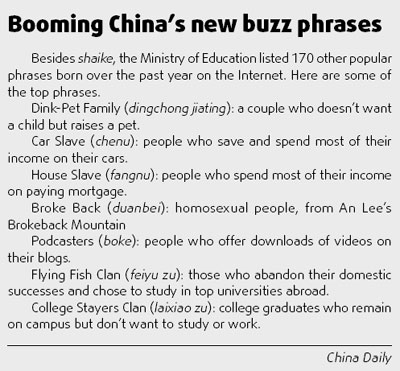Money talks
Zhou Jian's friend wanted to work for a joint venture company but had no clue about the salary, bonuses or employee benefits. Unlike in the West, talking about salaries in China is not the done thing. Zhou went online and through a search engine typed in the company's name. Surprisingly, the 26-year-old found the exact salary the company was offering. His friend was amazed.
This incident inspired Zhou, a government office worker from Changchun, Northeast China's Jilin Province, to set up a forum inviting people to share information about anything they know, especially their salaries. The website has become a huge hit, and people are revealing details that had not previously been discussed. Zhou's website is part of a social movement in China known as shaike, in which people freely share information.
Ke (guest) is commonly used to refer to a group of trendy people, and shai literally means "to bathe in the sunlight".

More than 9,600 users have registered on Zhou's website, and they have put up more than 23,000 topics since it opened in March. It has grown into one of the biggest sites of its kind.
"It is not a new thing to share and show on Internet, but the word shai can reflect people's attitudes towards the society we live in," Zhou says.
Salaries have always been a taboo topic of conversation in Chinese culture, but now, more people in China are disclosing their salaries online.
"I'm a department manger in a foreign company and make 8,000 yuan ($1,066) a month," says one shaike. "My company can reimburse me 2,000 ($266) to 3,000 ($400) per month for my living expenses. I also have an annual bonus around 100,000 yuan ($13,333). I'm quite satisfied with my current job!"
Another writer claims to be an editor of a magazine in Beijing and receives 5,000 yuan ($666) a month, plus some allowances and subsidies. "This is all right for me," he says.
However, not everybody is happy. "How poor I am! I only get 1,200 yuan ($160) a month from my boss," laments a PC salesman from South China's Jiangxi Province.
Popular topics on the site include "My gains from the stock market this month", "14 tricks to charge your mobile for free" and "Microsoft's forthcoming recruit plan". Some entries include pictures and video clippings.
"The Internet endows people with a great opportunity to share their lives with others without leaving real names," says Zhou Xiaozheng, professor of Social Science Department of Renmin University of China. "Curiosity is a basic human instinct. Everyone wants to peep into mysteries and gain information."
Type "shaike, China" in Google, and 4.5 million results will show up reflecting this latest trend. This August, the Ministry of Education listed shaike and another 170 newborn phrases over the past year.
Though some of these words are difficult to understand for even native speakers, they all represent new phenomenon from various lifestyles, and many phrases have appeared thanks to new technologies such as, the Internet.
Compared to some shaike websites, which have turned into quasi-beauty and fashion shows, Zhou has his own plan to develop the shaike forum.
"My forum's target group is white-collar workers, especially the confused youngsters who are at the starting point of their careers," says Zhou.
"This is a platform to provide them with absolutely useful information, most of which is impossible to get elsewhere."
Xiao Zhang, 27, was planning to apply for a job at a commercial bank. She was mostly concerned about her total salary and did not want to wait until her first pay day to find out.
This "wait-and-see" practice maybe confusing to Westerners, who know the exact details of their salary before they start their job. These important financial details are worked out before an employee joins a company. However in China, many workers will not know the exact amount. And they will not ask.
Xiao didn't have to wait for her first paycheck at the bank, because someone had already disclosed all the details on Zhou's website.
Zhou says people have different motivations in showing their salaries. While some mean to show off their fat wallets, others complain they deserve more and many are eager to know if they are being paid reasonably.
This January, a list of electricity company salaries was posted online and triggered a wave of public argument. It showed that some employees were earning up to 30 times more than the average salary. Even an electric ammeter recorder was paid more than 100,000 yuan ($13,333) per year.
Although some people doubted its creditability, most believed it revealed that staff at some State-owned companies, especially those monopolies in energy, power supply, telecommunication and tobacco, earned way above the country's average wage.

At the end of 2006, the State Grid issued a series of regulations to lower the salary of its employees, especially the administrative staff.
Another controversial issue triggered by shaike was the discussion of "gift money" during February's Spring Festival. Parents disclosed how much money they stuff into "red envelopes" and give to their children.
It was revealed that some lucky children can get up to 50,000 yuan ($6,666) from their parents, relatives, friends and acquaintances.
While most complained about yet another source of financial pressure, others were more optimistic, believing this was a way Chinese parents could instruct their children on how to manage their money.
From the economic sphere, shaike has quickly spread to other fields. Some people are disclosing their unhappy personal experiences, while others aim at exposing frauds, piracy and corruption in society.
The exposured and heated discussion about a Beijing restaurant, which was close by a rubbish dump and a parking plot, led government sanitation monitor department to close the restaurant. The restaurant owners were ordered to improve the sanitation conditions before reopening.
"It shows the consciousness of the rights of citizens is rising, and this will also promote the government to improve its supervision function," Dr Qi Guanghua, from Renmin University of China, says.
However, because of the anonymity on Internet, some shaike have been accused of cheating others and spreading rumors.
No one knows what social snapshot will come next on shaike, but one thing is for sure: Chinese want to live in a more open society.
"I believe my forum will grow bigger, because everyone has a desire and right to know and share," Zhou Jian says.
(China Daily 10/30/2007 page20)














